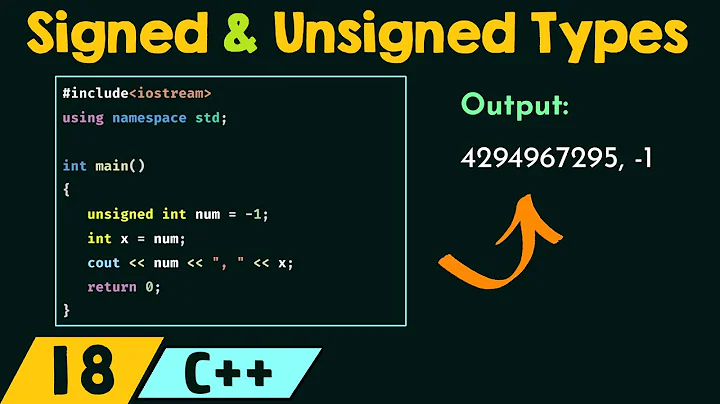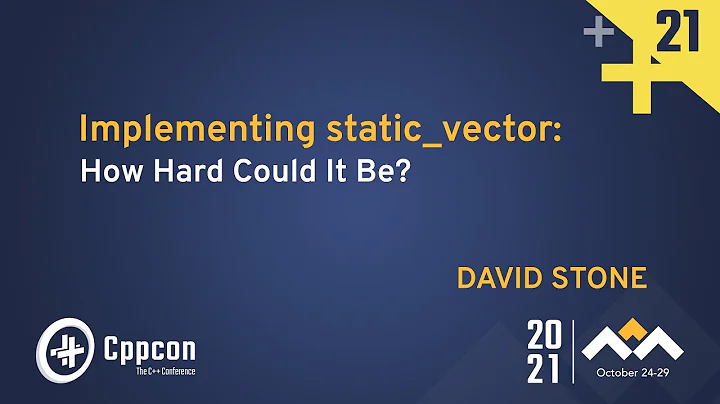Converting (void*) to std::vector<unsigned char>
Solution 1
You will need the length of the buffer. Once you do, we can do this:
unsigned char *charBuf = (unsigned char*)voidBuf;
/* create a vector by copying out the contents of charBuf */
std::vector<unsigned char> v(charBuf, charBuf + len);
Okay, the comment got me started on why I did not use reinterpret_cast:
In C++, the C-style cast is a convenience function -- it asks the compiler to choose the safest and most portable form of conversion over the set of available cast operators.
The
reinterpret_castis implementation defined and should always be the last thing on your mind (and used when you are necessarily doing a non-portable thing knowingly).The conversion between (
unsigneddoesn't change the type)char *andvoid *is portable (you could actually usestatic_castif you are really picky).
The problem with the C-style cast is: the added flexibility can cause heartaches when the pointer type changes.
Note: I agree with the general convention of not casting as much as possible. However, without any source provided, this is the best I could do.
Solution 2
You can't simply cast a void* to a std::vector<unsigned char> because the memory layout of the latter includes other objects, such as the size and the number of bytes currently allocated.
Assuming the buffer is pointed to by buf and its length is n:
vector<unsigned char> vuc(static_cast<char*>(buf), static_cast<char*>(buf) + n);
will create a copy of the buffer that you can safely use.
[EDIT: Added static_cast<char*>, which is needed for pointer arithmetic.]
Solution 3
The only time this would be legitimate is if you had already created a vector, and simply wanted to get it back.
void SomeFunc(void* input);
main() {
std::vector< unsigned char > v;
SomeFunc((void*) &v);
}
SomeFunc(void* input) {
// Now, you could cast that void* into a vector
std::vector< unsigned char >* v_ = (vector<unsigned char>*)input
}
I haven't actually tried to see if this will run, but that's the spirit of it. That said, if you are making this from scratch, you are definitely doing it wrong. This is really bad. The only time this could be even remotely understandable is if you are forced to implement the already defined "SomeFunc()".
Solution 4
using std::vector class for an already allocated buffer is not a solution. A std::vector object manages the memory and deallocates it at destruction time.
A complicated solution might be to write your own allocator, that uses an already allocated buffer, but you have to be very careful on several scenarios, like vector resizing, etc.
If you have that void* buffer bound through some C API functions, then you can forget about conversion to std::vector.
If you need only a copy of that buffer, it can be done like this:
std::vector< unsigned char> cpy(
(unsigned char*)buffer, (unsigned char*)buffer + bufferSize);
where bufferSize is the size in chars of the copied buffer.
Related videos on Youtube
Comments
-
Mike Douglas about 2 years
I have a
(void*)buffer that I need to convert tostd::vector<unsigned char>before I can pass it on. Unfortunately, my C++ casting skills a little weak. Any suggestions? -
 Ankit Roy about 15 years@tlholaday: static_cast<> can be used to cast to void*, so it should be used instead.
Ankit Roy about 15 years@tlholaday: static_cast<> can be used to cast to void*, so it should be used instead. -
 Ankit Roy about 15 years@dirkgently: +1, but please indicate that this creates a copy of the buffer -- that's important, but not obvious from your post.
Ankit Roy about 15 years@dirkgently: +1, but please indicate that this creates a copy of the buffer -- that's important, but not obvious from your post. -
dirkgently about 15 years@j_random_hacker: OP mentioned 'passing' -- I assumed he meant a copy. Anyway, updated source with comments.
-
 Johannes Schaub - litb about 15 yearsyeah if anything, why not static_cast<>. it's not impl defined, it's portable. it's just not convenient. but it's much safer :) anyway, you've provided rationale why you did use c-style cast. like it, so +1 :D
Johannes Schaub - litb about 15 yearsyeah if anything, why not static_cast<>. it's not impl defined, it's portable. it's just not convenient. but it's much safer :) anyway, you've provided rationale why you did use c-style cast. like it, so +1 :D -
 Johannes Schaub - litb about 15 yearsthat said, i actually think casting from void* to any object pointer is undefined behavior when done with reinterpret_cast. the standard says one can cast between two pointers that have pointer-to-object type. but void* is pointer-to-void-type. though i imagine that's an uncommon interpretation
Johannes Schaub - litb about 15 yearsthat said, i actually think casting from void* to any object pointer is undefined behavior when done with reinterpret_cast. the standard says one can cast between two pointers that have pointer-to-object type. but void* is pointer-to-void-type. though i imagine that's an uncommon interpretation -
dirkgently about 15 years@litb: IIRC, lookup the section on safely derived pointer values. That section may have an answer.
-
 Johannes Schaub - litb about 15 yearsi will have a look into the revisions of c++03. i can't find anything in c++98 that allows it. but ill tell you if i find it. cheers :)
Johannes Schaub - litb about 15 yearsi will have a look into the revisions of c++03. i can't find anything in c++98 that allows it. but ill tell you if i find it. cheers :) -
dirkgently about 15 years@litb: I meant look up C++0x drafts. Will keep watching.





![[XII] C Code Snippet| Signed and Unsigned Character Representation and Range Calculation | ZerOOne](https://i.ytimg.com/vi/5HRY_9fH5xo/hq720.jpg?sqp=-oaymwEcCNAFEJQDSFXyq4qpAw4IARUAAIhCGAFwAcABBg==&rs=AOn4CLAySNoSqjTXQqZvIrOvy9fS4cde2g)


